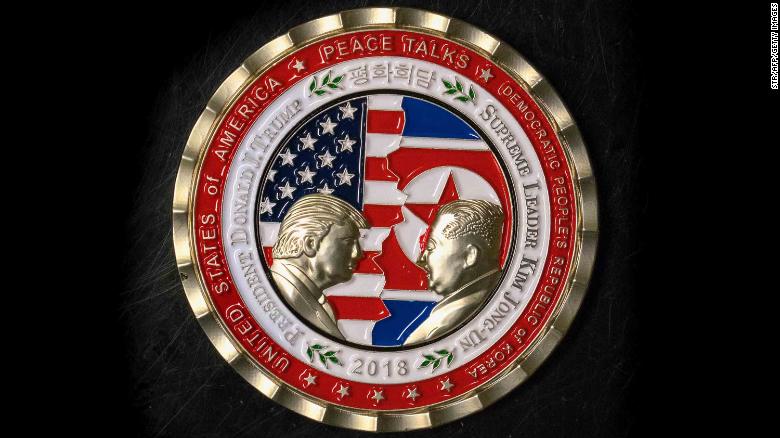Donald Trump Cancels US-North Korea Nuclear Summit in Singapore
 Above: A commemorative coin released by the White House celebrating the now canceled nuclear summit between the US and North Korea Chasen Richards '19Yesterday, with a release of a letter to DPRK Chairman Kim Jong-un, President Trump called off the long-awaited US-North Korean nuclear summit in Singapore. This cancellation comes on the heels of increased tension spoiling the lull that followed the announcement of the summit. In the letter, the President cited instances of aggression from North Korea in the last few weeks, referencing the might of the US nuclear arsenal, hearkening to the escalating hostility between the two leaders over exchanged tweets in the tail end of 2017.President Obama stated that the North Korean issue would be the biggest security threat faced by his successor, so when the summit was announced and rapprochement with Korea’s hermit kingdom in reach, many hailed this as a decisive diplomatic win for an administration plagued by tariff escalation and the failure of the Iran Deal. The summit was the product of months of high-level talks between major stakeholders like China and South Korea. Rapprochement grew first from the unified Korean Olympic teams that competed in February’s Winter Games, and led into the suspension of further missile testing, with the summit announced in early March. The lull in tensions saw greater engagement from the historically isolated DPRK, including the release of three American prisoners, the historic meeting with South Korean President Moon Jae-in at the DMZ, and the planned demolition of the Punggye-ri nuclear development site, which occurred hours before the cancellation.The lead up to this announcement was studded with several diplomatic failures. In response to a standard US-South Korean military exercise, the DPRK suddenly suspended high level talks with South Korean officials. In the following days, John Bolton, the President’s hawkish national security advisor, and Vice President Mike Pence mentioned the ‘Libyan Model’ as a possibility for North Korean denuclearization. This was a reference Libya’s peaceful nuclear disarmament in 2003, which likely contributed to the 2011 Libyan civil war, where a NATO bombing campaign led to the fall of the regime and the death of its leader, Muammar Gaddafi. This is the worst-case scenario for the North Korean regime, which views nuclear arms as a means of regime survival.The summit was met with intense skepticism from regional experts, who believed the DPRK to be negotiating in bad faith. It has been the North’s practice to make diplomatic overtures after a series of hostile actions, and many saw this as a diversion from the North’s missile tests throughout 2017. As of today, both sides have expressed a willingness to meet in the future, each claiming the diplomatic moral ground in their official remarks. The only good outcomes of this cancellation can be the possibly of further discussion between the DPRK and its counterparts in the south, and perhaps the sudden fire sale in US-North Korean Summit challenge coins.Sources:https://www.nytimes.com/2018/05/24/world/asia/north-korea-trump-summithttps://www.cnn.com/2018/05/15/politics/north-korea-suspends-south-korea-talks-us-military-drills/index.htmlhttps://www.nytimes.com/2018/02/08/world/asia/olympics-north-korea-joint-teamhttps://www.vox.com/2018/4/26/17288108/north-korea-south-korea-talks-kim-jong-un-moon-jae-in-handshakehttps://www.cnn.com/2018/05/24/politics/north-korea-summit-coin-reaction/index.html
Above: A commemorative coin released by the White House celebrating the now canceled nuclear summit between the US and North Korea Chasen Richards '19Yesterday, with a release of a letter to DPRK Chairman Kim Jong-un, President Trump called off the long-awaited US-North Korean nuclear summit in Singapore. This cancellation comes on the heels of increased tension spoiling the lull that followed the announcement of the summit. In the letter, the President cited instances of aggression from North Korea in the last few weeks, referencing the might of the US nuclear arsenal, hearkening to the escalating hostility between the two leaders over exchanged tweets in the tail end of 2017.President Obama stated that the North Korean issue would be the biggest security threat faced by his successor, so when the summit was announced and rapprochement with Korea’s hermit kingdom in reach, many hailed this as a decisive diplomatic win for an administration plagued by tariff escalation and the failure of the Iran Deal. The summit was the product of months of high-level talks between major stakeholders like China and South Korea. Rapprochement grew first from the unified Korean Olympic teams that competed in February’s Winter Games, and led into the suspension of further missile testing, with the summit announced in early March. The lull in tensions saw greater engagement from the historically isolated DPRK, including the release of three American prisoners, the historic meeting with South Korean President Moon Jae-in at the DMZ, and the planned demolition of the Punggye-ri nuclear development site, which occurred hours before the cancellation.The lead up to this announcement was studded with several diplomatic failures. In response to a standard US-South Korean military exercise, the DPRK suddenly suspended high level talks with South Korean officials. In the following days, John Bolton, the President’s hawkish national security advisor, and Vice President Mike Pence mentioned the ‘Libyan Model’ as a possibility for North Korean denuclearization. This was a reference Libya’s peaceful nuclear disarmament in 2003, which likely contributed to the 2011 Libyan civil war, where a NATO bombing campaign led to the fall of the regime and the death of its leader, Muammar Gaddafi. This is the worst-case scenario for the North Korean regime, which views nuclear arms as a means of regime survival.The summit was met with intense skepticism from regional experts, who believed the DPRK to be negotiating in bad faith. It has been the North’s practice to make diplomatic overtures after a series of hostile actions, and many saw this as a diversion from the North’s missile tests throughout 2017. As of today, both sides have expressed a willingness to meet in the future, each claiming the diplomatic moral ground in their official remarks. The only good outcomes of this cancellation can be the possibly of further discussion between the DPRK and its counterparts in the south, and perhaps the sudden fire sale in US-North Korean Summit challenge coins.Sources:https://www.nytimes.com/2018/05/24/world/asia/north-korea-trump-summithttps://www.cnn.com/2018/05/15/politics/north-korea-suspends-south-korea-talks-us-military-drills/index.htmlhttps://www.nytimes.com/2018/02/08/world/asia/olympics-north-korea-joint-teamhttps://www.vox.com/2018/4/26/17288108/north-korea-south-korea-talks-kim-jong-un-moon-jae-in-handshakehttps://www.cnn.com/2018/05/24/politics/north-korea-summit-coin-reaction/index.html